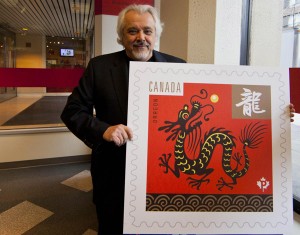Sino-Canadian ties to cover more sectors
President and vice-premier target stronger Canada economic relations
BEIJING – China is willing to increase imports from Canada and to boost cooperation in energy and other areas, Chinese leaders said on Thursday.
During a meeting with Canadian Prime Minister Stephen Harper, President Hu Jintao said cooperation should be strengthened across a range of sectors.
“The countries should enhance political dialogue to expand common ground,” Hu said.
To boost trade links, Hu suggested that the potential of both economies to interact be realized and cooperation expanded.
Vice-Premier Li Keqiang called for the countries to “promote energy trade”.
|
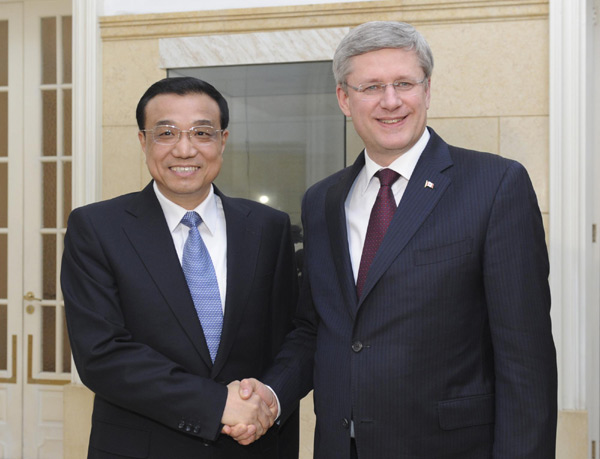 Vice-Premier Li Keqiang (L) shakes hands with Canadian Prime Minister Stephen during a meeting in Beijing on Thursday. [Photo/Xinhua] |
“Canada is a nation that has bountiful energy resources, and China is a stable and reliable consumption market”, he said in a keynote speech at a Beijing business forum.
And the two nations should also enhance energy cooperation, including renewable and nuclear, and promote joint oil and mining projects, he said.
“We should ensure a stable partnership in the field of energy resources,” Li said.
Harper is leading a delegation of more than 40 business executives during his visit as he endeavors to sell more oil to China, attract Chinese investment in Canada and win more access to China for Canadian companies.
Harper’s visit comes as Canada plans to diversify exports of crude oil to Asia, including China, and aims to speed up the regulatory-approval process for large energy projects. This comes on the heels of US President Barack Obama rejecting TransCanada Corp’s $7 billion pipeline to the US Gulf Coast.
“The potential for China-Canada economic and trade cooperation has never been bigger than today,” Li said.
“We are glad to see that Canada is diversifying its trade and investment and stressing the importance of the Asian market,” Li said.
“Asia is the most dynamic and potential region worldwide in terms of economic growth and China is a major economy in Asia.”
China plans to expand domestic consumption and develop strategic emerging sectors.
Harper’s visit has resulted in a number of deals on energy. Canadian businesses signed nearly $3 billion worth of deals with Chinese enterprises on Thursday.
Canada reached an agreement with China on Thursday to facilitate uranium exports by giving Canadian uranium producers more access to China’s civilian nuclear power industry.
China could start receiving Canadian oil as early as 2016 if a pipeline project from Alberta to Canada’s Pacific coast goes ahead, said Enbridge Pipelines chairman Patrick Daniel, who accompanied Harper on the visit.
Harper agreed with Li by saying that China-Canada economic relations are “reaching a new level”.
After meeting President Hu Jintao on Thursday, Harper said: “I think Canada-China relations are continuing along a very positive route.
“Canada has the resources, technological sophistication and geo-strategic positioning to complement China’s economic growth strategy,” he said.
“And China’s growth, in turn, complements our determination to diversify our export markets.”
China is Canada’s second-largest trading partner. Bilateral trade stood at almost $50 billion in 2011, up $6 billion from 2009. The two countries set a target of increasing bilateral trade to $60 billion by 2015.
“There is more room for us to enlarge bilateral trade, as it is still small,” Li said.
Premier Wen Jiabao said on Wednesday the two nations should discuss the possibility of signing a free trade agreement.
Two-way investment
“We welcome Canadian companies to invest in China’s western, central and northeastern regions. We also encourage Chinese companies to invest in Canada,” Li said.
On Wednesday, the two nations concluded negotiations on a foreign investment promotion and protection agreement, which began in 1994.
Canadian investment in China surged by 39 percent year-on-year in 2010 to $5 billion. Chinese investment in Canada totaled $14 billion during the same period, up by 9 percent from 2009.
China has been encouraging its enterprises to expand globally, and experts have said that the current global slowdown has provided a number of investment opportunities.
Source: China Daily
China, Canada boost strategic partnership
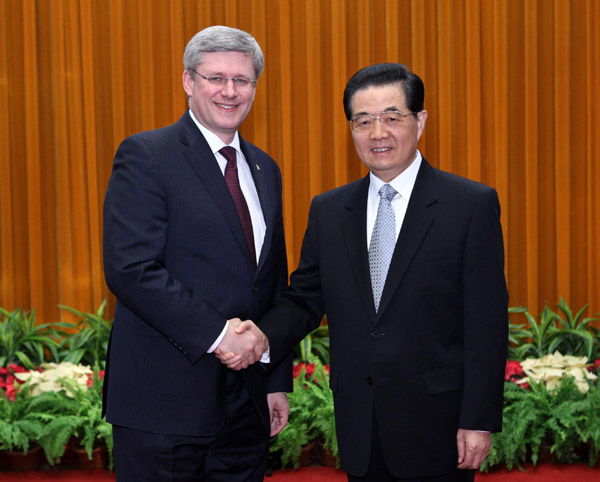 |
|
Chinese President Hu Jintao shakes hands with Canadian Prime Minister Stephen Harper before their meeting at the Great Hall of the People in Beijing February 9, 2012. [Photo/Xinhua]
|
BEIJING – President Hu Jintao and visiting Canadian Prime Minister Stephen Harper agreed on Thursday to further facilitate the bilateral strategic partnership and promote greater progress of cooperation in diversified areas.
The agreement was made during their meeting in the Great Hall of the People.
“The two countries should stick to the principle and spirit of the China-Canada Joint Statement and enhance dialogue in the political field in a bid to expand common ground,” Hu said.
The China-Canada Joint Statement was issued during Harper’s previous visit in 2009.
Hu called on both sides to respect each other’s development paths chosen by their people, and respect and accommodate each other’s core interests and major concerns.
To boost trade links, Hu suggested full play be given to the strong complementarity of both economies while expanding cooperative areas.
Hu also proposed the enhancement of youth exchanges between both countries and the strengthening of coordination in global and regional affairs in order to promote recovery and sustainable growth of the world economy.
Harper, on his second visit since taking office in 2006, applauded the new progress of bilateral ties in recent years.
He said the two countries have seen an increasing consensus and common interests on many major issues.
Canada is committed to developing a strategic partnership with China based on respect and mutual benefit and hopes to maintain high-level exchanges and political dialogue, and enhance cooperation in such areas as trade, energy and investment, he said.
Harper also vowed joint efforts with China to address global and regional issues, to safeguard world peace and to boost new progress of global economic governance.
In a meeting with top legislator Wu Bangguo, Harper said his government highly values Canada-China relations and is committed to cementing win-win cooperation in trade and other areas.
Harper brought to Beijing a large delegation of cabinet ministers and lawmakers, as well as a large business delegation with representatives from the energy, transport, and education sectors.
Wu, chairman of the Standing Committee of the National People’s Congress (NPC), said he regards parliamentary exchanges as an important part of the China-Canada strategic partnership.
“The NPC has set up sound cooperative ties with the Canadian Senate and the House of Commons. The regular exchange mechanism between the two countries’ parliaments has achieved positive progress,” Wu said.
He hailed the important consensus and progress the two countries made during Harper’s current visit, adding that these achievements will inject new vitality to the bilateral win-win cooperation.
Vice Premier Li Keqiang also met with Harper later on Thursday and both attended a trade seminar for enhancing two-way trade.
Harper came to Beijing on Tuesday for a five-day trip as guest of Premier Wen Jiabao. The two premiers had talks on Wednesday and witnessed the signing of several bilateral agreements regarding cooperation in trade, technology, education, forestry, energy and agriculture.
Harper will also visit south Guangdong Province and the southwest municipality of Chongqing.
China and Canada forged diplomatic ties in November 1970. They established their strategic partnership in September 2005 during Hu’s visit to Canada.
Canadian Prime Minister Steven Harper greets Chinese Premier Wen Jiaobao
”]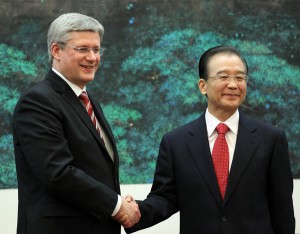 BEIJING – Premier Wen Jiabao on Wednesday urged the forging of a long-term, stable and diversified partnership with Canada in the energy and resource sector.
BEIJING – Premier Wen Jiabao on Wednesday urged the forging of a long-term, stable and diversified partnership with Canada in the energy and resource sector.
“The negotiation on China-Canada investment protection agreement has concluded. We hope to sign the important document as soon as possible to facilitate two-way investment,” Wen told visiting Canadian Prime Minister Stephen Harper in the Great Hall of the People.
Harper came to Beijing Tuesday for his second China visit since taking office in 2006.
Calling the two economies highly compatible, Wen proposed to draw up an all-round plan on boosting bilateral economic cooperation based on joint research on economic complementarities.
He also urged discussions on the feasibility of signing a China-Canada free trade agreement.
“China is ready to expand imports of energy and resource products from Canada and enhance cooperation in clean and renewable energy, energy-saving, environmental protection, and the peaceful use of nuclear energy,” Wen said.
The two countries should also explore cooperation in the areas of the judiciary, culture, technology, agriculture, finance and the polar ocean, he added.
Harper, who is bringing a large business delegation to China, said Canada welcomes China to expand investment in his country and expects closer bilateral cooperation in trade, energy, resources, finance and culture.
He vowed closer coordination with China in global and regional affairs and to boost bilateral ties to a new level.
Harper told Wen that Canada-China relations are long-lasting with strategic ties based on mutual respect.
Wen spoke positively of the growth of China-Canada relations since the forging of diplomatic ties in November 1970, citing frequent high-level exchanges, enhanced two-way trade and investment, and increasing exchanges in the areas of culture, education and technology.
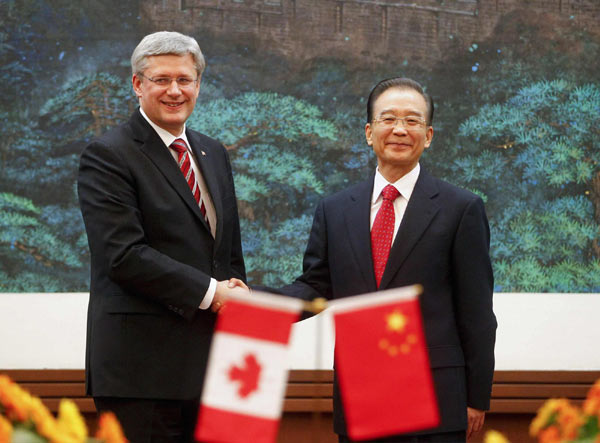 |
|
Canada’s Prime Minister Stephen Harper shakes hands with Chinese Premier Wen Jiabao after a signing ceremony at the Great Hall of the People in Beijing February 8, 2012. [Photo/Agencies] |
“Under the new circumstances, the two countries should implement the consensus reached in the China-Canada joint statement, maintain mutual respect, equality and non-interference in each other’s internal affairs and beef up understanding through dialogue,” Wen said.
The China-Canada joint statement was issued during Harper’s last China visit in 2009.
Prior to the talks, Wen hosted a welcome ceremony for Harper. They also witnessed the signing of several bilateral agreements regarding cooperation in trade, technology, education, forestry, energy and agriculture areas.
Besides Beijing, Harper will also visit south Guangdong province and the southwest municipality of Chongqing during his five-day trip.
Canada and China celebrated their 40th anniversary of diplomatic relations in 2010. China is Canada’s second-largest trading partner and a key customer for Canadian natural resources and agricultural products.
Canada unveils stamps to mark Chinese new year
Canadian designer Louis Fishauf shows a poster of his new creation – stamps featuring the upcoming Chinese lunar new year, the Year of the Dragon, in Toronto, Canada, Jan 10, 2012. Canada Post issued the stamp to celebrate Chinese lunar new year, which falls on Jan 23, 2012. [Photo/Xinhua]
Ease of doing business in Canada
According to the World Bank’s International Finance Corporation Canada ranked # 13 in the world for ease of doing business. Canada was ranked # 3 in the world for starting a business, and 5th in the world for protecting investors. China ranked 91 overall. More information can be found at http://www.doingbusiness.org/rankings

